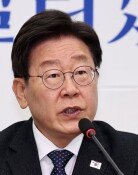Pyongyang implies possible preemptive or retaliatory nuclear strikes
Pyongyang implies possible preemptive or retaliatory nuclear strikes
Posted January. 11, 2021 07:22,
Updated January. 11, 2021 07:22
North Korean leader Kim Jong Un said at the 8th Congress of the North Korean Workers’ Party on Friday, “We seek to strengthen military power constantly based on the country’s status as a nuclear state until aggressive hostile threats end.” He did not exclude a possibility of a preemptive or retaliatory nuclear strike while remarking that it would not abuse its nuclear weaponry. His message made it clear that Pyongyang has no intention of giving up on nuclear weapons, which runs completely counter to three years’ line for denuclearization negotiations.
Kim has described the United States as its biggest enemy, which seemingly intends to restore the support of North Korean residents that has been affected by poor economic performance and tighten pressure against Washington. A detailed plan to maximize nuclear power was illustrated in line with his remarks, according to which Pyongyang plans increase an accuracy rate for a target within a range of 15,000 kilometers with the aim of advancing its capabilities for preemptive and retaliatory nuclear strikes. In other words, most parts of the U.S. mainland can be within the range of the North’s nuclear attack.
Kim has also mentioned nuclear-powered submarines and hypersonic arms. As a strategic weapon capable of reaching anywhere in the world at a sudden speed, nuclear-powered submarines can stay underwater for a long period of time, making it hard to detect their navigation routes. That is why Washington sees Pyongyang’s nuclear-powered submarines as a game changer and feels jittery if they are deployed on combat arrangement. Also, it is hard to strike hypersonic arms in the current missile defense system.
Notably, there was no mentioning of denuclearization in Kim’s speech. He may intend to show its willingness to transition from complete denuclearization to nuclear disarmament when Washington and Pyongyang resume talks. If North Korea embarks on nuclear disarmament negotiations, it automatically means that it is determined to maintaining its status as a nuclear state. This will hold back the negotiation process with Washington.
Kim left a message to South Korea that the inter-Korean relations could go back to three years ago if Seoul does not suspend joint military drills with Washington and purchase of cutting-edge military equipment. By contrast, he treated the South's proposal on cooperative works for quarantine and humanitarian purposes as peripheral issues. Kim's message is no different than the North's threat that it can put everything at stake by using the asymmetric power of nuclear weaponry whenever it wants.
In such a severe situation where Pyongyang, in essence, gave up on a line for denuclearization talks, the South Korean Ministry of Unification said, "We hope to set a new starting point for peace and prosperity on the Korean peninsula in the near future.” The South only reiterates its rosy outlook on the inter-Korean relations even amid the North's nuclear threats. It reacts with a disappointingly low level of firmness and urgency based on long years’ submissive attitude in dealing with Pyongyang. The South Korean government should call on the North Korean regime to return to the negotiating table for complete denuclearization. Even now it is not too late to get out of a self-built rosy future to look squarely at the realities.







